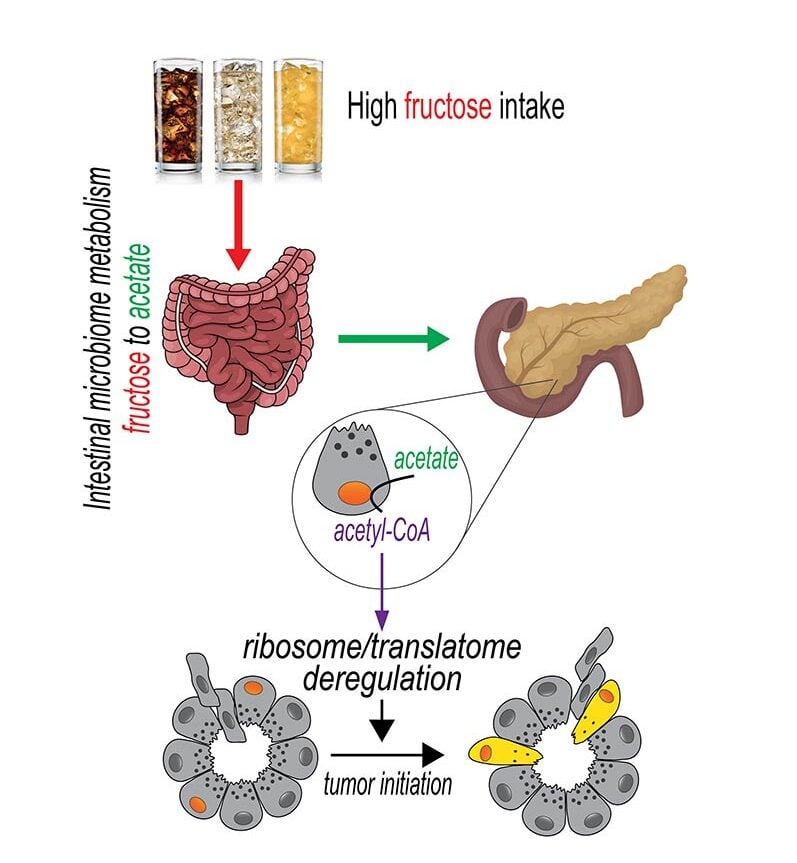Grant title: Interrogating the impact of fructose-to-acetate conversion for nucleolus organisation and pancreatic cancer predisposition
Institution: University of Padova
Grant awarded: September 2025
In this study, my group will examine whether excessive consumption of fructose can elevate the risk of developing pancreatic cancer, an aggressive and essentially untreatable disease. Fructose is a natural sweetener that is commonly added to packaged foods and beverages. In fact, fructose overconsumption is a staple of western diets and that has profound ramifications for public health. Our work will deepen the understanding of the relationship between dietary fructose and pancreatic cancer, with the ultimate goal to find means to prevent the onset of the disease. I am extremely grateful to Wereld Kanker Onderzoek Fonds and World Cancer Research Fund International for giving me the opportunity to carry out this project, which is very close to my heart because it relates to people’s everyday lives and could influence common habits – Dr Alessandro Carrer
Background
Over the past decades, intake of fructose has increased dramatically, primarily due to the consumption of beverages and foods that are sweetened with high-fructose corn syrup. Significant concern is mounting around the increasing consumption of fructose worldwide for several reasons, including a possible link with elevated cancer incidence. Yet, a causative relationship is not supported by experimental data.
Pancreatic cancer is among the deadliest forms of cancer and essentially untreatable. A key challenge for public health is to lower its incidence. Several unhealthy lifestyles are associated with increased risk for pancreatic cancer, but the role of diet remains unclear. In particular, the impact of dietary fructose has not been directly tested, despite mounting epidemiological evidence.
We recently showed how fructose is metabolised in the gut and why this may contribute to its tumour-promoting effects. The mechanism hinges on the generation of a pivotal metabolite: acetyl-CoA. We have found that acetyl-CoA is also critical for the onset of pancreatic cancer.
Aims and objectives
Preliminary data shows that dietary fructose promotes pancreatic carcinogenesis in mouse models. We hypothesise that microbiota convert excess ingested fructose into acetate, a source of acetyl-CoA. We aim to identify the molecular alterations caused by increased acetyl-CoA availability.
How it will be done
We will deploy mouse models of pancreatic cancer development. These mice carry inbred mutations that predispose to pancreatic cancer, and they spontaneously develop tumours. Mice will drink the amount of fructose equivalent to the daily consumption of a 12-ounce can of soda for humans, for extended periods of time. Tumour formation and progression will be evaluated.
We will also interrogate structural and functional alterations at specific sites within the nucleus of cancer cells – the nucleoli. Preliminary work indicates that nucleoli serve as a cellular switch to sense acetyl-CoA levels and coordinate cellular response. Mechanistic studies will be performed using cultures of pancreatic cancer cells where levels of acetyl-CoA can be manipulated to mimic fructose intake.
Similarly, individuals undergoing surgery to remove pancreatic cysts will be provided with a bottle of soda pre-operation. The removed pancreatic samples will be examined and compared to controls.
Potential impact
Consumption of simple carbohydrates, in particular fructose, has been linked to the obesity pandemic and increased cancer risk, but there is still considerable public debate over whether or to what extent fructose intake should be limited. We will test the ability of dietary fructose to promote pancreatic cancer onset and progression, while interrogating very specific molecular alterations responsible for tumorigenesis. This will inform on the need to refine guidelines on fructose consumption and will identify targetable determinants of increased cancer risk.

Created by Dr Alessandro Carrer, University of Padova
